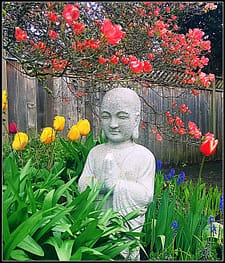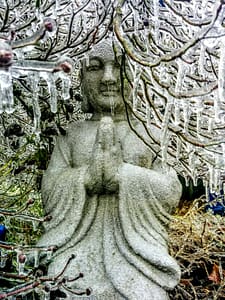The Relapse
by Brian
 The old man is sitting on the back patio in his bathrobe, a half-empty bottle of wine in front of him.
The old man is sitting on the back patio in his bathrobe, a half-empty bottle of wine in front of him.
He holds the stem between forefinger and thumb and swirls the wine around in the glass. He sniffs deeply of the blood red liquid, takes a sip, and lets the wine linger in his mouth before swallowing.
“Ahhh,” he says. “Good tannins. A bit sweet, but also dry. Wonderful dark color. Malbec is an interesting grape. It thrives in very particular growing conditions. The best Malbec is grown in the area around Mendoza, Argentina.”
“I thought you didn’t drink,” I say.
“I didn’t. Until right now, I hadn’t had a drink in 20 years. But I said to myself, you know what, why the fuck not? You have so little to look forward to as you get older. Why the fuck not?”
The old man secures his bathrobe and sits up straight.
“Sit down, have a glass,” he says.
I grab a glass from the house and sit down. To my right, in the garden, is a statue of the Buddha.
The only thing standing between us and the apes is a bit of snobbery.
The old man pours the remaining Malbec evenly into the two glasses. The wine is rich and strong. I don’t know what the fuck tannins are, but I can detect a hint of ripe blackberries.
“It’s truly remarkable when you think about the synergistic complexities that go into making a bottle of wine,” he says. “The soil, the weather, the harvesting, the crushing and pressing, fermentation and bottling…they all have to be just right. Oenology requires knowledge of chemistry, horticulture, viticulture, plant biology, hydrology, zymology. And of course there is the history of it, the thousands of years of accrued human knowledge that goes into winemaking.”
“It’s good wine,” I say.
“Yes, this is good. I feel as though I’m having a reunion with an old friend whom I’d convinced myself I didn’t like. ‘Well-met, sir,’ he says to the bottle of Malbec. ‘I’ve missed you. I’d forgotten how much I enjoy your company.’”
He takes another slow, deliberate sip, going through the wine tasting motions.
“The refined palate of the oenophile rejoices in subtleties that are lost on the uninitiated,” he says. “Some call it snobbery. But the only thing standing between us and the apes is a bit of snobbery.”
“Why did you quit drinking in the first place?”
“When I was selling wine I overdid it with the hooch. It became too much…too much. So I stopped. But sobriety presents its own problems. Sobriety is like a doctor’s waiting room. Everything’s so plain it makes you sick. Without booze, there’s never that…release. No hangovers, either.”
“Did you miss it?”
“Like a dead brother! And wine especially. But I will probably never enjoy a glass of wine as much as I’m enjoying this one.”
“Absence makes the heart grow fonder?”
“Absence makes the heart grow duller.”
There is tyranny in his perfect peace.
The old man gets up and comes back with another bottle. His bathrobe is dangerously close to opening. He absent-mindedly tucks it together.
“Some people can do moderation, I suppose,” he says as he fills our glasses. “But they tend to be bores. I am highly suspicious of balance and equilibrium. Balance and equilibrium are the hallmark of tyrants.”
I glance at the Buddha—master of balance, God of equilibrium—hands held in the Namaste position: The divine in me honors the divine in you.
“Most drunks when they quit drinking require a substitute. They take up exercise, or they find God. I suppose I read more. Reading gave me the same thing drinking did: a reprieve from living.”
The praying Buddha stares straight ahead, unflappable, wearing a wry smile, not budging for the rain, the sun, the snow, the wind. Resolute in his nothingness, complete in his Nirvana. Yet there is tyranny in his perfect peace.
“Monks had a proud winemaking tradition. They drank and lived a holy existence. That seems like a good balance to me.”
“Don’t tell me you’re thinking of becoming a born-again, too.”
“No. Most born-agains drink and fuck their way through everything in their path and when their libido dries up they find God. But it’s the same God they found at the bottom of the bottle and the bottom of a cunt.”
I swirl the wine around in my glass and it sloshes over the side onto my shorts.
Without their opium, the people destroy themselves.
“I have fond memories of the church,” says the old man. “I remember the look of the stained glass windows, the sounds of the voices and organ music echoing off the high ceilings. My father held me and sang. I felt the rumbling of his voice. My father never sang. I knew there was something about church that made people act differently. It seemed like a magical place. And it was—the actual experience of being there, before I got older and the religion got in the way of the God.”
The Buddha, attached to his non-attachment, looks mocking, like the entire idea of sitting motionless under the Bodhi tree is a cosmic joke.
“Religion, too, you must replace with something. You can’t just pull out a central support like that. Christianity is a load-bearing wall of Western civilization. What have we replaced it with? Consumerism? Sex? State power? Technology? They eliminated religion from Communist countries and boom—100 million dead in the 20th century. The West is headed for a similar cataclysm, you wait and see. The people need their opium. Without it, they destroy themselves.”
A small bird lands on the Buddha’s head and scratches its beak. The bird shits on the Buddha’s head and flies away. The Buddha continues smirking, unconcerned.
“Bah,” says the old man, waving his hand dismissively. “It’s too much…too much.”
“What is?”
“All of it. Every damn bit of it.”
